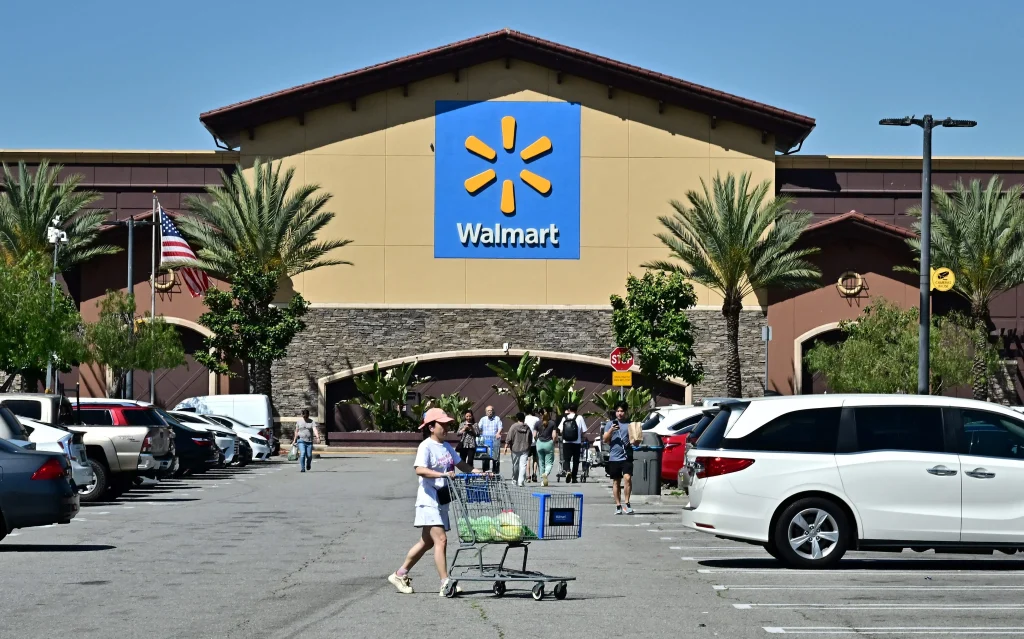WALMART last week warned that tariffs will force it to raise some prices. Over the weekend, US President Donald Trump hit back, telling the world’s largest retailer to “eat the tariffs”.
But while the president might have the bark, it is Walmart’s customers who have the bite – literally and metaphorically – when it comes to eating tariffs. Americans have the power to abandon retailers, food manufacturers and even high-end boutiques that engage in “greedflation”, just as they did in the wake of the pandemic and Russia’s invasion of Ukraine. That would do more to force companies to absorb the levies than any Trump outburst.
Walmart is the wrong target for the president’s ire. The chain is known for helping its customers save money. True to form, chief executive officer Doug McMillon said Walmart would not allow the higher import costs on clothing and home furnishings – the categories most exposed to the trade war because many are manufactured in China – to influence the amount it charged for food.
He has a point. He notes that after Covid hit, stories of supply chain disruption conditioned consumers to expect higher prices. Many companies duly obliged.
BT in your inbox

Start and end each day with the latest news stories and analyses delivered straight to your inbox.
Now, the trade war is preparing Americans to pay more for everything from avocados to sneakers. Consumers expect prices to rise at an annual rate of 7.3 per cent over the next year, the highest since 1981, according to the University of Michigan.
Walmart
Against this backdrop, Walmart, known for its low prices, would usually benefit. But this time around, it might not have a monopoly on hard-up shoppers trading down – at least when it comes to groceries. What will keep Walmart on its toes is not the president’s bluster, but the US expansion of the German food discounters Aldi and Lidl.
Aldi arrived in America almost 50 years ago, and has quietly amassed about 2,500 stores, with plans to reach almost 3,200 by 2028. That’s still fewer than Walmart’s 5,200 (including Sam’s Club), but Aldi is growing quickly.
Lidl only crossed the Atlantic in 2017 and has fewer than 200 stores. It initially struggled, but after adapting to American tastes it too is starting to resonate with US shoppers. Both chains are enjoying a surge in customer visits, according to data from Placer.ai.
Walmart can get away with charging more than Aldi and Lidl. It carries a much bigger range of products, including more national brands, allowing customers to do all their shopping under one roof.
But the mega-retailer can’t afford to let its premium to the discounters expand. Aldi and Lidl also face tariff-related costs, but they’re privately held and don’t have to report to investors every quarter. During its earnings call last week, Walmart CEO McMillon also said he wanted to expand the company’s operating profit faster than sales. Lidl’s owner, Schwarz Group, and rival Aldi have made no such commitments.
The German discounters don’t even have to cut prices; they could simply not raise them as much as rivals. This is exactly what happened in Britain in the wake of the 2008 financial crisis. Although the no-frills grocers arrived in the early 1990s, their combination of low prices and improved products won over the cash-strapped middle classes. As they lured away customers, traditional supermarkets were forced to slash prices, cratering profits.
Voting with wallets
There are other ways that consumers can vote with their wallets. For example, by ditching brand names in favour of private labels, which tend to be cheaper.
Retailer-owned brands have been outpacing household names for the past five years, according to research group Numerator. Although branded goods are now expanding faster, many manufacturers that pushed up prices, such as PepsiCo and Kraft Heinz, are still trying to increase sales.
Perhaps the best example of consumers baulking at high prices is not in the grocery aisle, but in top-end boutiques. The average price of iconic luxury products in Europe tracked by analysts at HSBC Holdings has risen by 54 per cent since 2019.
Luxury sales excluding currency movements were flat in 2024, according to Bain & Co, and are widely expected to drop this year. Even the rich don’t like being ripped off.
The best way for companies to counter accusations of greedflation is to spell out to consumers exactly how much of the cost of duties they are being asked to bear. Documenting the tariff rate and corresponding price increase as clearly as possible will show exactly how much the retailer is “eating”.
Of course, this is similar to the approach that Amazon.com reportedly contemplated but dropped after White House pressure.
But companies’ resolve should not crumble in the face of such criticism. It is better to endure an uncomfortable few hours or days of presidential wrath than act in a way that might alienate consumers. Elected officials come and go. But as retailers ranging from British grocers to big bling have so painfully learned, once shoppers abandon you, it’s very hard to win them back. BLOOMBERG


